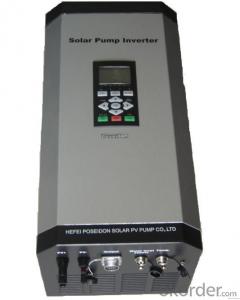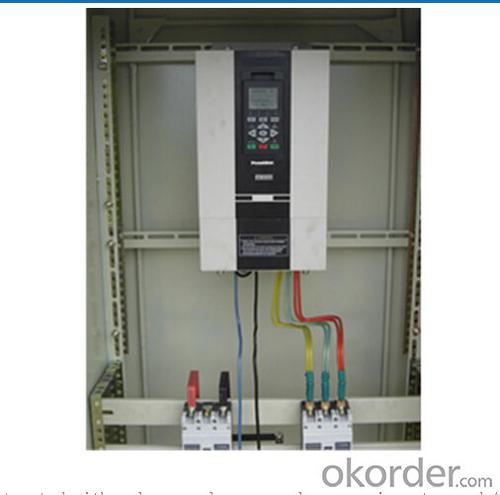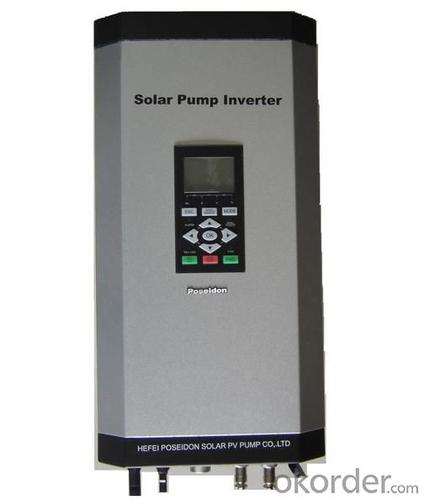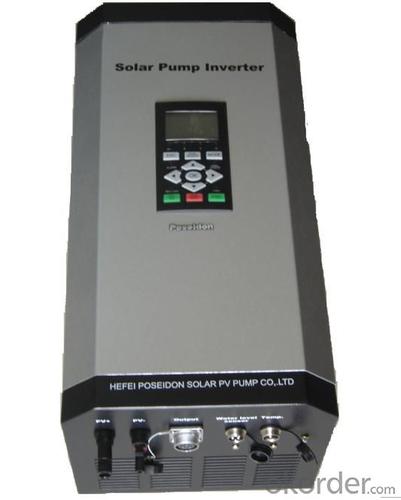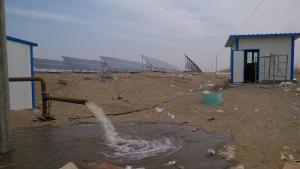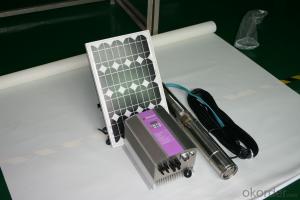2 Hp Solar Pump Inverter FCPM75KH
- Loading Port:
- China Main Port
- Payment Terms:
- TT OR LC
- Min Order Qty:
- -
- Supply Capability:
- -
OKorder Service Pledge
Quality Product, Order Online Tracking, Timely Delivery
OKorder Financial Service
Credit Rating, Credit Services, Credit Purchasing
You Might Also Like
Solar pump inverter FCPM75KH Product Description:
Solar water pumping system is constructed with solar panel array,solar pump inverter and AC water pump, DC current produced from solar panel will be delivered to solar pump inverter,and it will convert it into AC current to drive water pump,and will automatically regulate output frequency according to sun radiance intensity,maximally realize MPPT tracking function.
Features
Adopting the proposed dynamic VI maximum power point tracking (MPPT) control method, with fast response, and reliable operation, achieves efficiency of 99%.
Designed with variable frequency driver, greatly improves efficiency
Extremely high efficiency
Digital mode control, with automatic operation and manual operation mode options
Complete protection functions
Adopts intelligent IPM module, with high reliability
LCD display and operation panel, in real time presents operating data
Optional for water level measurement and control circuit
Applicable for general ACC pumps, like centrifugal pump, piston pump etc.
Independent intellectual property; Highly effective, the redundant reliability, exempts the maintenance and the long life.
The pumps are soft started, fully protected.
No batteries are used. So better Sunlight, more water.
Datasheet.
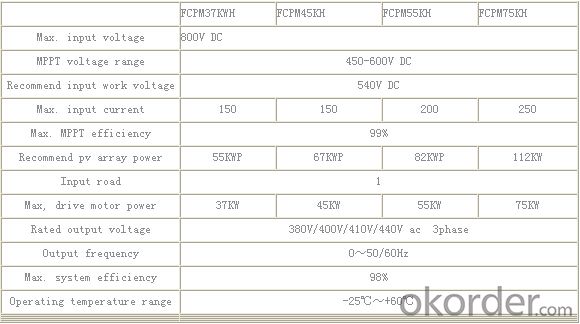
- Q: Can a solar pump be used for water supply in dairy farms?
- Yes, a solar pump can be used for water supply in dairy farms. Solar pumps utilize sunlight to generate power for pumping water, making them a sustainable and cost-effective solution for water supply in agricultural settings. They can effectively meet the water requirements of dairy farms, ensuring a reliable source of water for the animals and various farm operations. Additionally, solar pumps are environmentally friendly and can reduce dependence on traditional energy sources, making them a suitable choice for sustainable farming practices.
- Q: How much does a solar pump cost?
- The cost of a solar pump can vary depending on various factors, such as the brand, size, capacity, and additional features. On average, a basic solar pump can range from $500 to $2,500, while more advanced models with higher capacity and additional functionalities can cost up to $10,000 or more.
- Q: How does a solar pump handle water with high levels of manganese?
- A solar pump handles water with high levels of manganese by employing a filtration system that effectively removes or reduces the presence of manganese particles. The pump's filtration mechanism, typically equipped with a combination of screens, cartridges, or other filtration media, traps the manganese particles as the water passes through, preventing them from entering the pump and causing damage. This ensures the efficient and safe functioning of the solar pump while providing access to clean and manganese-free water for various applications.
- Q: How do solar pumps handle water with high iron or mineral content?
- Solar pumps can handle water with high iron or mineral content by utilizing filtration systems. These pumps are equipped with filters that effectively remove the iron and mineral particles from the water, allowing it to flow smoothly through the system. This ensures that the solar pump operates efficiently and prevents any potential clogging or damage caused by the presence of high iron or mineral content in the water.
- Q: Can a solar pump be used in areas with limited access to financing options?
- Yes, a solar pump can be used in areas with limited access to financing options. Solar pumps are a cost-effective and sustainable alternative to traditional pumps that require electricity or fuel. Since solar pumps use the sun's energy to operate, they eliminate the need for ongoing operational costs. Additionally, there are various organizations and initiatives that provide support and funding for renewable energy projects, including solar pumps, in underserved areas. These options can help overcome financial barriers and make solar pumps accessible to communities with limited financing options.
- Q: Can solar pumps be used in remote areas without access to the power grid?
- Yes, solar pumps can be used in remote areas without access to the power grid. Solar pumps are designed to operate using solar energy, which makes them ideal for remote locations where there is no access to electricity. By harnessing the power of the sun, these pumps can provide a reliable source of water for various purposes such as irrigation, drinking water, and livestock. They are cost-effective, sustainable, and do not require any connection to the power grid, making them a practical solution for remote areas.
- Q: Are solar pumps suitable for use in disaster relief situations?
- Yes, solar pumps are suitable for use in disaster relief situations. They are highly efficient, reliable, and do not require electricity or fuel to operate, making them ideal for areas with limited or disrupted power supply. Additionally, solar pumps are easy to transport, install, and maintain, enabling quick response and deployment during emergencies.
- Q: How does the efficiency of a solar pump compare to a diesel pump?
- The efficiency of a solar pump is generally higher than that of a diesel pump. Solar pumps utilize direct sunlight to generate electricity, which is then used to power the pump. This process is highly efficient as it directly converts solar energy into mechanical energy, resulting in minimal energy losses. On the other hand, diesel pumps rely on the combustion of diesel fuel to generate power, which is inherently less efficient due to energy losses in the fuel combustion process. Additionally, solar pumps do not require ongoing fuel costs and have lower maintenance needs compared to diesel pumps, making them a more cost-effective and environmentally friendly option in the long run.
- Q: Can a solar pump be used for hydroponics or greenhouse irrigation?
- Yes, a solar pump can be used for hydroponics or greenhouse irrigation. Solar pumps are a sustainable and cost-effective solution for providing water to plants in hydroponics systems or greenhouses. They harness energy from the sun to power the pump, eliminating the need for electricity or fuel. This makes them an environmentally friendly option, especially in remote areas where access to electricity may be limited. Additionally, solar pumps can be easily integrated into existing irrigation systems, ensuring efficient water distribution for optimal plant growth.
- Q: Can a solar pump be used for sewage or wastewater treatment?
- Yes, a solar pump can be used for sewage or wastewater treatment. Solar pumps are commonly used in wastewater treatment systems to circulate and transfer sewage or wastewater. They are efficient, cost-effective, and environmentally friendly as they rely on solar energy to operate, reducing the need for electricity or fuel. Additionally, solar pumps can be easily integrated into existing sewage or wastewater treatment plants, providing a sustainable solution for water management.
Send your message to us
2 Hp Solar Pump Inverter FCPM75KH
- Loading Port:
- China Main Port
- Payment Terms:
- TT OR LC
- Min Order Qty:
- -
- Supply Capability:
- -
OKorder Service Pledge
Quality Product, Order Online Tracking, Timely Delivery
OKorder Financial Service
Credit Rating, Credit Services, Credit Purchasing
Similar products
Hot products
Hot Searches
Related keywords


